On March 18th, Chennai reported its first COVID case, that of a 20-year-old man who reached the city from New Delhi in a train. Fast forward by a little over four months, and the city has seen a total of 1,07,109 cases, with 11,720 active cases at present (figures as on August 7th).
Due to two major clusters — the returnees of Tablighi Jamaat congregation and Koyambedu market — the city recorded thousands of cases in April and May. The good news, however, is that from reporting 3,000 odd cases every day, the city now records about 1,200 odd cases daily.
What transpired between that one case on March 18th to over 1,00,000 cases in August?
Here is a timeline of COVID cases in the metropolitan city, and how the government has tried to tackle it.
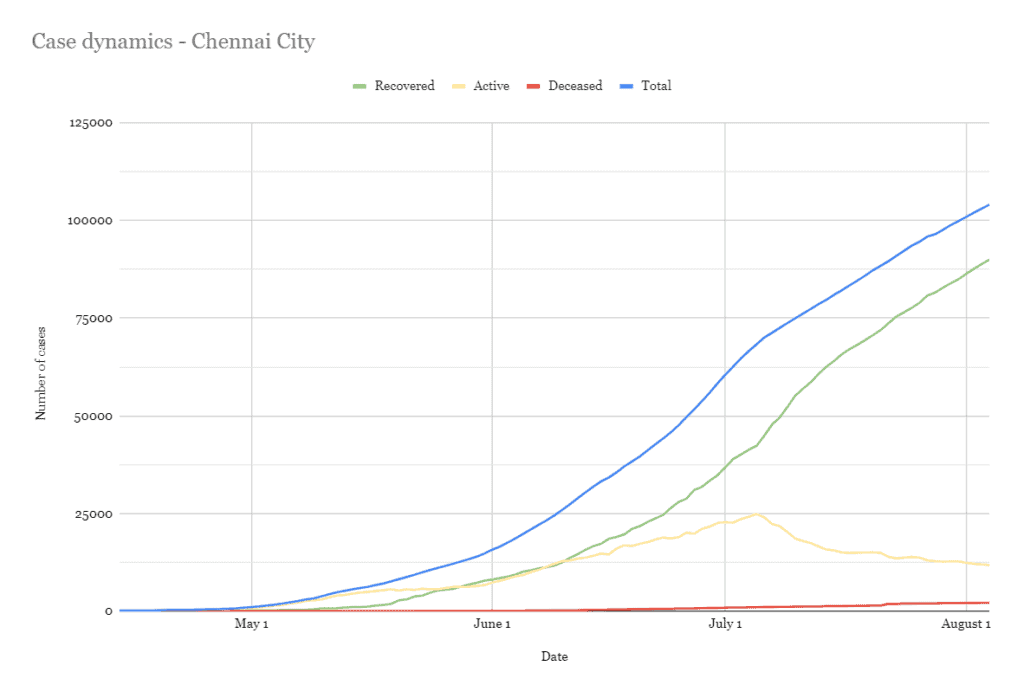
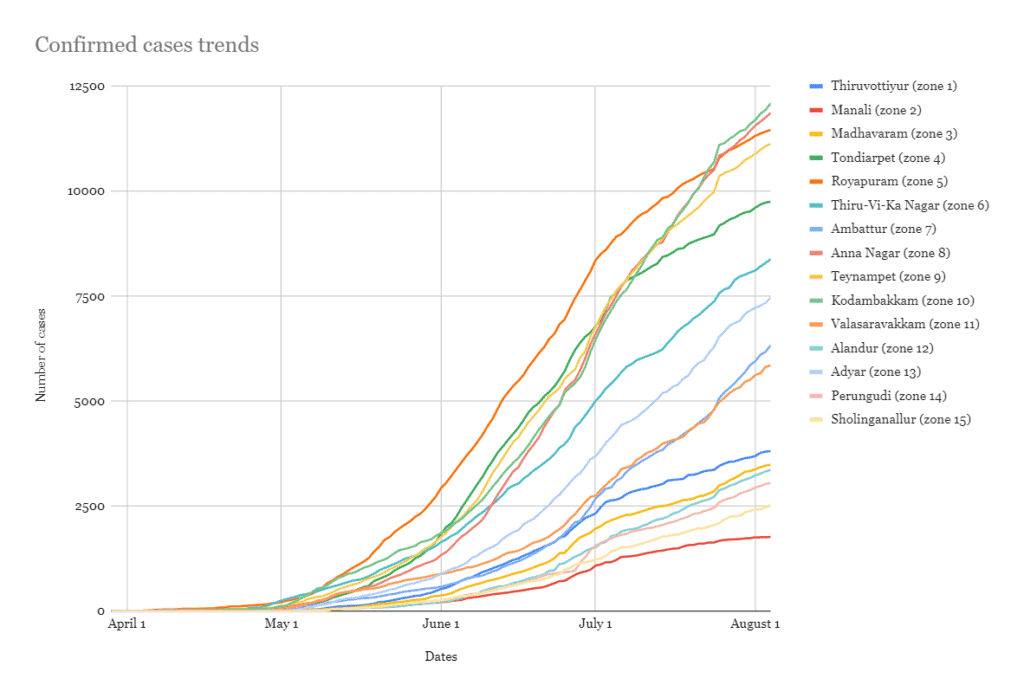
Till March 31st
Chief Minister Edappadi K Palaniswami announced the closure of commercial establishments and educational institutions on March 15th till March 31st to halt the virus in its tracks. The state borders were closed on March 20th and Section 144 was imposed on March 24th.
As people rushed to return to their native places, there was a surge in the number of people thronging stations, airports and bus terminals. The civic body began thermal screening at the bus termini in Chennai Egmore, Central and Koyambedu on March 16th. Similarly, passengers entering the city from other districts, including the COVID-affected regions were tested.

The Chennai Airport authorities started aggressive screening of domestic passengers flying from Kerala and Delhi from March 20th. Subsequently, the corporation mandated home quarantine (28 days) for the travellers after screening at the airport.
Domestic breeding checkers (DBCs) were deployed to visit all houses in the city to note down the symptoms including fever and cough.
To ensure people exercise caution, the local body began stamping stickers at the residences of home quarantined due to travel history to affected countries or people with chronic breathing symptoms.
On March 31st, Tamil Nadu recorded 57 COVID cases linked with the Tablighi Jamaat congregation in Nizamuddin Markaz Mosque, New Delhi, that took place in early March. The event became the reason behind one of the COVID clusters in the state.
The civic body rolled out GCC Corona Monitoring, an application to map people with fever symptoms, home-quarantined persons and keeping a tab on crowds in Chennai.
April 2020
To ensure that no person comes in contact with a COVID-positive patient, the state health department adopted a containment plan in line with global practices. According to the plan, a 5-km containment zone (where the COVID patient resides) and a 3-km buffer zone around the containment zone were earmarked. The Greater Chennai Police began isolating the houses of COVID patients by barricading the streets.
On April 11th, State Chief Secretary K Shanmugam constituted Zonal Special Task Teams in Tamil Nadu to trace COVID patients and their contacts. IAS Rajendra Kumar and ADGP Abash Kumar were appointed to oversee and coordinate COVID measures in Chennai.

In a bid to increase the number of samples being tested every day, the civic body ordered 50,000 rapid testing kits through the Tamil Nadu Medical Services Corporation (TNMSC). The State Health Department and GCC’s Public Health Department set-up 26 camps for sample collection. Walk-in kiosks at 35 places including at the Corporation’s dental clinic near Langs Garden Road and UPHC, Periampet were set-up.
The Chennai Trade Centre at Nandambakkam was converted into an institutional quarantine facility. With 550 beds, makeshift cubicles were raised. The Corporation issued orders to 747 wedding halls in the city to increase the number of COVID Care Centres (CCC) in the city. Asymptomatic patients were admitted to CCC and critical patients would undergo treatment at the hospitals.
May 2020
Dr J Radhakrishnan was appointed as GCC’s Nodal Officer to oversee the COVID situation. The Koyambedu Market emerged as a new cluster in the city due to crowd mismanagement. Vendors from other districts who travelled to the market were also tested positive.
According to a health official quoted by The Hindu, Chennai had four major clusters – Koyambedu, frontline workers, hospitals and media.
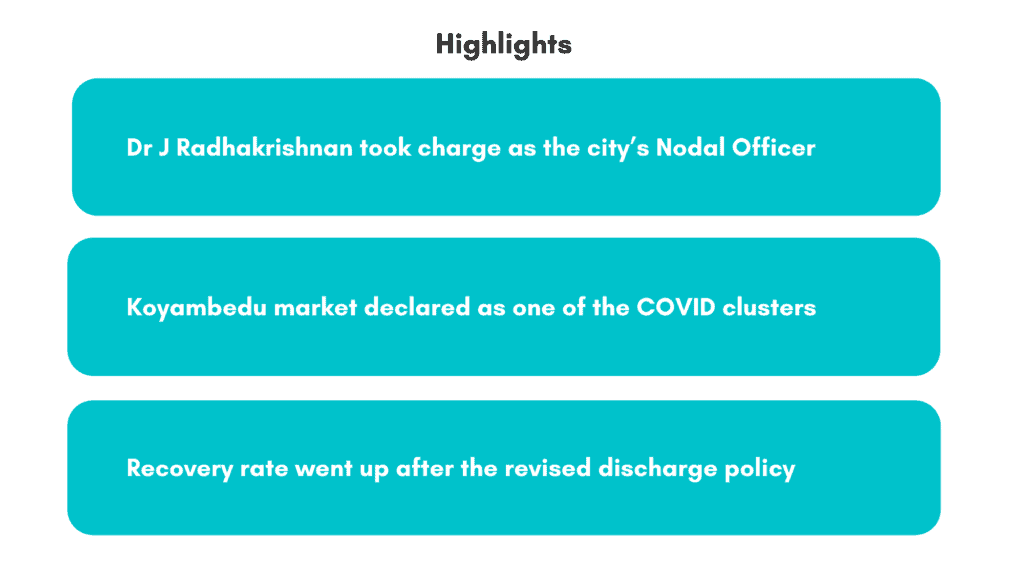
On May 8, the Centre issued a revised discharge policy, according to which mild and moderate cases admitted at CCCs would not be tested before discharge. These two categories of patients can be discharged after 10 days of the onset of their symptoms, provided they are asymptomatic.
After implementing the rules, the number of people discharged significantly rose. On May 9th, according to the bulletin, 171 patients were discharged. Between May 16th and 22nd, 2,990 patients were discharged.
On May 29th, Chennai recorded 6,489 active cases, 7,289 patients recovered, while 113 succumbed to the disease.
On the testing front, as many as 3,811 persons underwent COVID tests on May 31st.
June 2020
Analysing the trend, experts from Tamil Nadu Dr MGR Medical University had predicted that the city may record 1.5 lakh COVID-19 cases and up to 1,600 deaths by the second week of July and peak in mid-October.
A Times of India report revealed that the city had recorded 460 deaths till June 8 as against the state health department’s count – 224. Following which, a committee was set-up to reconcile the statistics.
On June 12th, Dr J Radhakrishnan was reappointed as the State Health Secretary, replacing Dr Beela Rajesh.
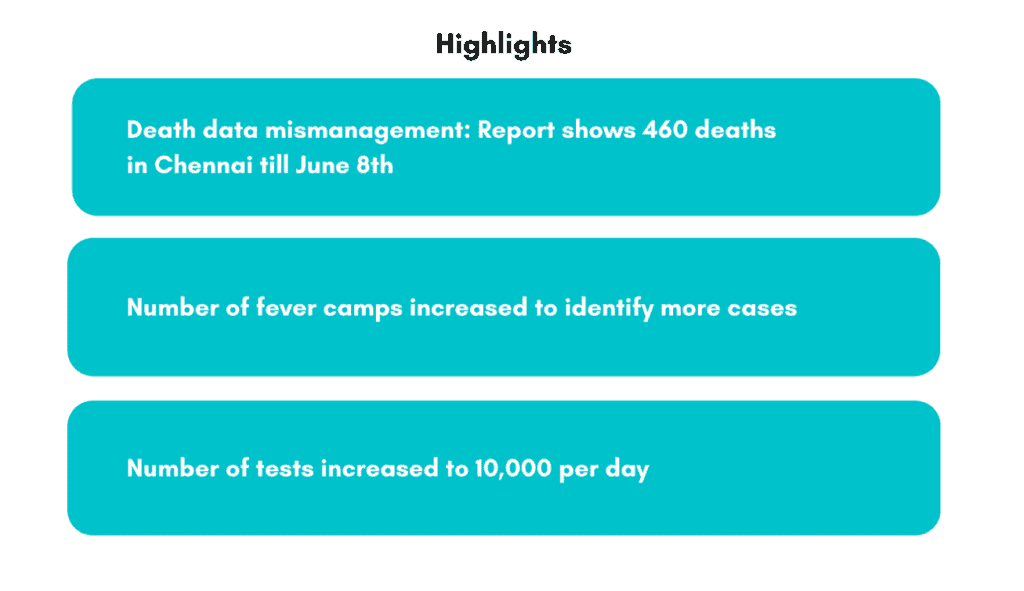
GCC increased the number of fever camps to 680 from 150 to identify COVID cases. At the camps, symptomatic patients and the ones who exhibit Influenza-like Illness (ILI) were identified and tested. To micromanage the cases, one Divisional Health Officer (DHO) for every ward was appointed.
The number of containment zones came down to 64 from 1050 streets in Chennai. The GCC adopted a revised containment plan, where a street will be contained if it has a minimum of five COVID cases or 20 positive contacts.
The number of tests increased from 5,000 to 10,000 every day in Chennai. On June 25th, the civic body tested 9,371 people in Chennai. On June 30th, the city recorded 2,393 fresh cases and the total tally went up to 55,969 cases and 21,681 patients were recorded as active cases.
July 2020
To track patients who are home quarantined, the civic body rolled out an application named HQIMS (Home Quarantine and Isolation Management system) that will have basic details of people in home quarantine. On July 2nd, the city recorded 4,343 cases, the highest single-day spike causing panic.
India’s second plasma bank was inaugurated in late July at Rajiv Gandhi Government General Hospital (RGGGH) in Chennai. Even though plasma therapy is still under trials, 26 patients hailing from Chennai were reportedly cured in July.
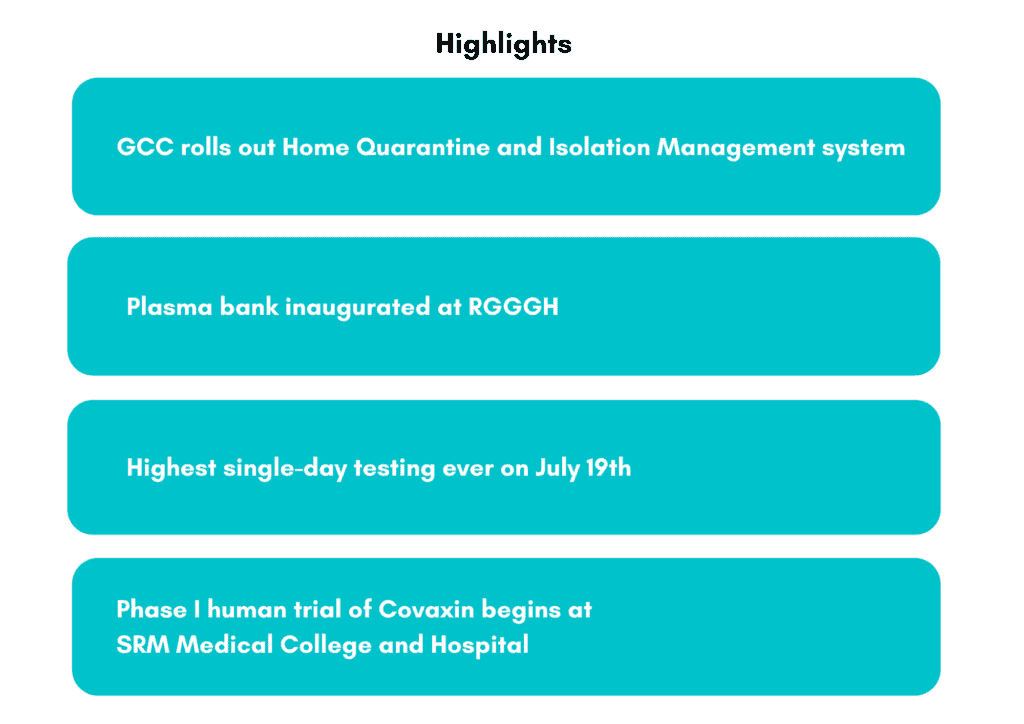
The number of COVID cases reported in the city came down significantly. According to GCC’s bulletin on July 10, the overall average growth rate of new cases stood at -5.2% for one week.
On July 19th, the civic body recorded the highest testing numbers. As many as 14,030 people underwent COVID testing in Chennai.
Phase-I human trial of Covaxin (an indigenously developed vaccine for COVID-19 –) began at SRM Medical College and Hospital in late July. Five other COVID-related research are happening in the institution including Siddha-based Kabasura Kudineer and BCG vaccine trial.
On July 31st, Chennai recorded 1013 fresh cases and the total tally was 98,767. In all, 2,092 patients succumbed to the disease. On July 30th, 12,990 persons underwent COVID test in the city.
August 1st to 7th
According to the data provided by the civic body, 92,128 people have recovered from the disease in the city, which marks a recovery rate of 86.8% as on August 6th.
Zones (Manali, Tondiarpet, Royapuram and Teynampet) that were hotspots a few weeks ago have currently less than 10% active cases. The bulletin further stated that Manali has recorded 94% recovery rate. On August 6th, 11,595 persons were tested. The number of walk-in centres stands at 37 as on August 6th.

The testing guidelines have been changed and the corporation has stated that anyone can get the swab testing done. It may be noted that previously testing samples were collected only if the person had come in contact with a COVID patient or if they had been recommended by field officials to undergo a test.
Unable to get COVID-19 statistics zonewise for GCC on day to day basis. Suggest me a site which gives the same.